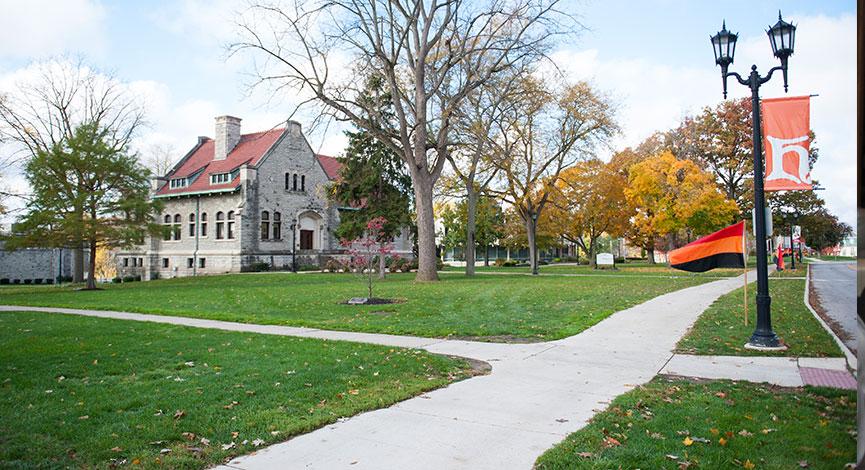
Research is a critical component of a college education. Students are able to learn and hone a variety of professional skills through conducting research, analyzing information, and presenting their findings.
This year, the departments of English, History, and Religion came together and initiated the inaugural Humanities Symposium to celebrate and promote student research. Over the two-day event, 25 students gave presentations on research topics ranging from bird symbolism to prohibition to the superhero culture.
It was truly a combined effort between students and faculty that highlighted not only exceptional academic excellence, but also Heidelberg’s culture of collaboration and support.
Practice Makes Perfect
The majority of the presenters were seniors working on their capstone projects. The symposium was a chance for them to practice their presentation skills and get feedback on their works-in-progress that most will present at the Student Research Conference this spring.
“It’s helpful for students to articulate what their working on so they can gain confidence and better understand their material,” said Dr. Dave Kimmel, Professor of English.
Practicing public speaking skills and receiving feedback is an important step for these students who will need to complete their projects by the end of the year. Associate Professor of History Dr. Courtney DeMayo believes the benefits of this type of event go beyond simply practicing a speech, but also fosters a stronger academic community.
This event provided a forum for my students to showcase the research they have been working on all semester, practice for public speaking and presenting, and simulated a professional conference in the humanities. I enjoyed seeing my students really rise to the occasion.
Digging Deep
In addition to professional skills, research allows students to explore topics that interest them, and that can ultimately lead to finding a career, or even better – a passion.
Summer Hunter-Kysor’s research project came from the semester she spent in Argentina where she was introduced to a history of dictatorships and violence that has left a mark on the country.
In Argentina I took a culture class that involved visiting many memory sites within my city, where the old torture and detention centers were located. After taking that class, I began to notice the lasting impacts the dictatorships and campaign of terror had on the modern culture. So, I decided to do a more in-depth study of the subject.
As a senior international studies and history double major, Summer believes her research is a way to help society learn from the past.
“Not many people look into our past and recognize the consequences of previous decisions. I believe that we could all have a better understanding of our own nation and of the world as a whole with a little bit more historical study.”
Summer’s research has implications not only in history, but political science, economics, psychology, and international relations. Making these connections is a way to see how her major fits into a larger conversation.
“Students got to see how their work connects to their peers. Faculty often talk about how well our disciplines fit together – this really showed our students that overlap,” said Dr. DeMayo.
Collaboration is Key
The symposium also offered a chance for underclassmen to get involved and begin thinking about their own research.
“First year students were able to see examples of the kinds of work Humanities students complete. They saw what opportunities were available to them and what the faculty expect of upper level students,” said Dr. DeMayo
The symposium was organized and run by sophomore English majors. They handled all the scheduling, promotion, and logistics of the event. Getting involved early helps students feel connected to their major and can help spark ideas for their own research projects. Dr. Kimmel was one of several voices that wanted to offer students an opportunity to not only practice professional skills, but also to engage younger students in the Heidelberg academic community.
We want the younger students to feel a sense of belonging and ownership of their major. They can explore opportunities and develop leadership skills. Some of them are already talking about independent research projects and other outside the classroom learning opportunities.
The Ultimate Goal
By encouraging, supporting, and enabling student research, Heidelberg wants every student to be able to excel in their field and understand how their career impacts the world.
“Since the beginning of my studies at Heidelberg, I have definitely strengthened my research and presentation skills. I’ve had so much practice and received a lot of helpful constructive criticism. From Model U.N., to student research conferences and research papers, or even as a member of various groups on campus, overall my academic ability has improved tremendously,” said Summer.
The Humanities Symposium was a great exercise in showing and telling that Heidelberg students are prepared to find and take advantage of distinctive opportunities in their careers.